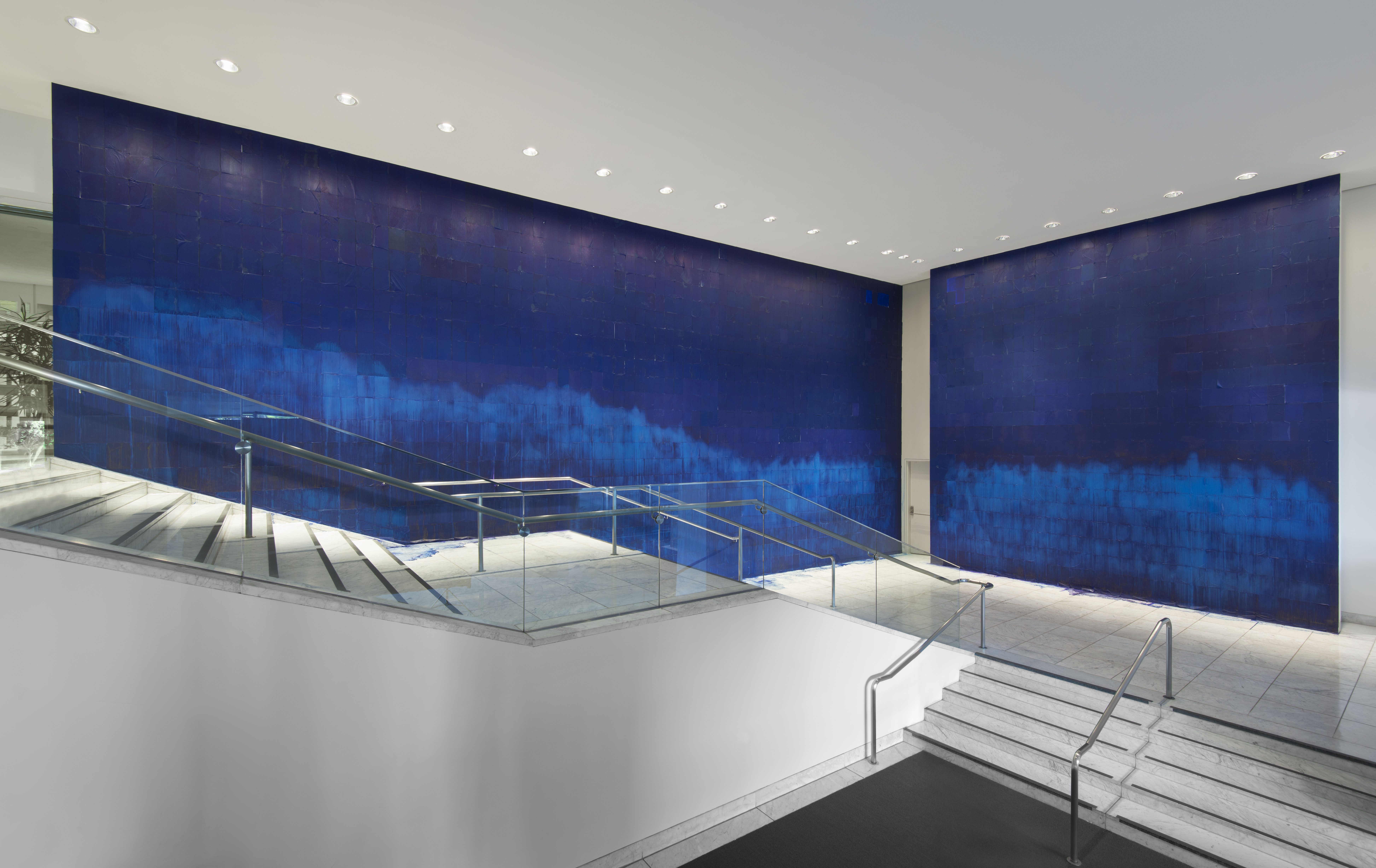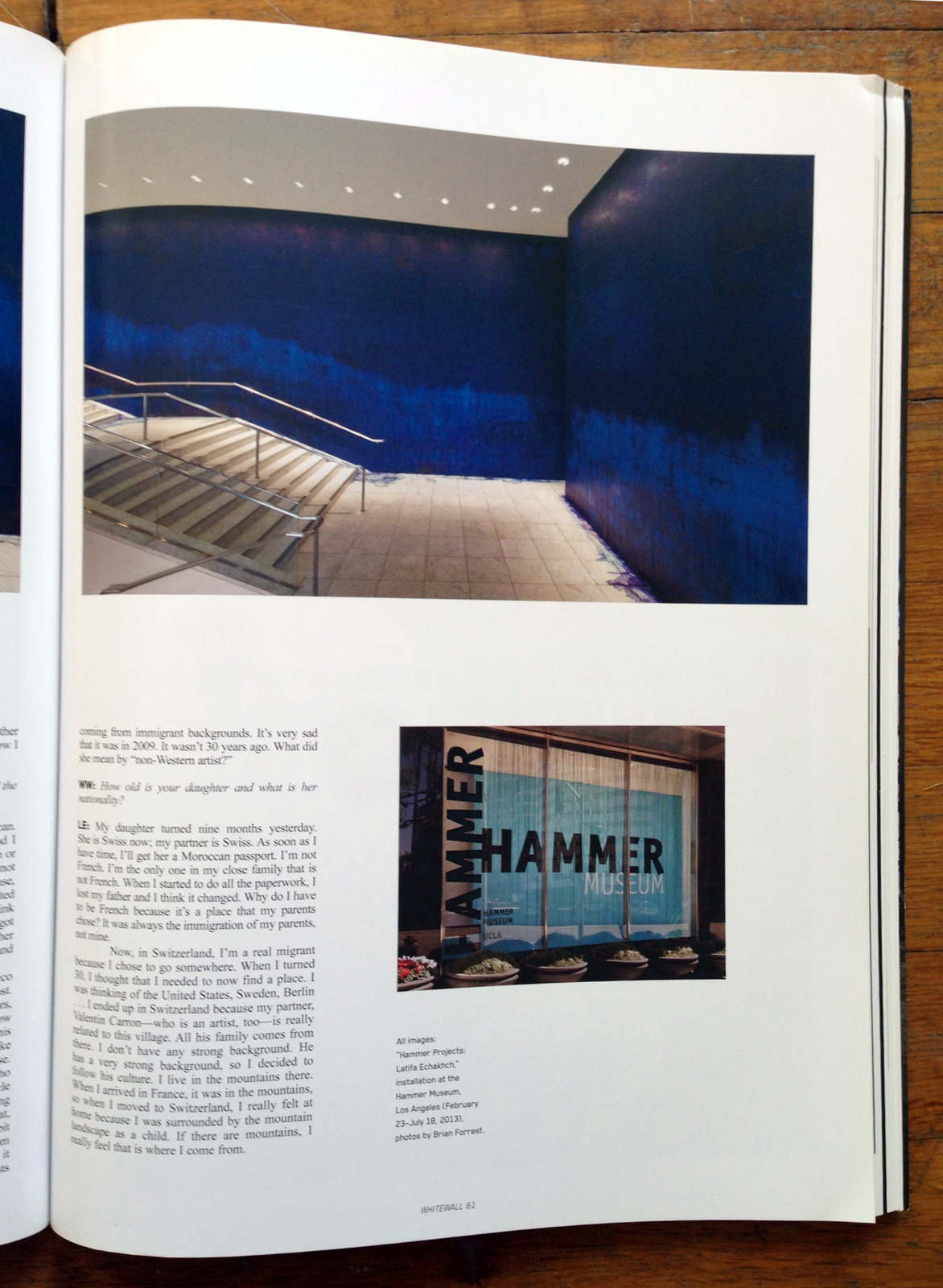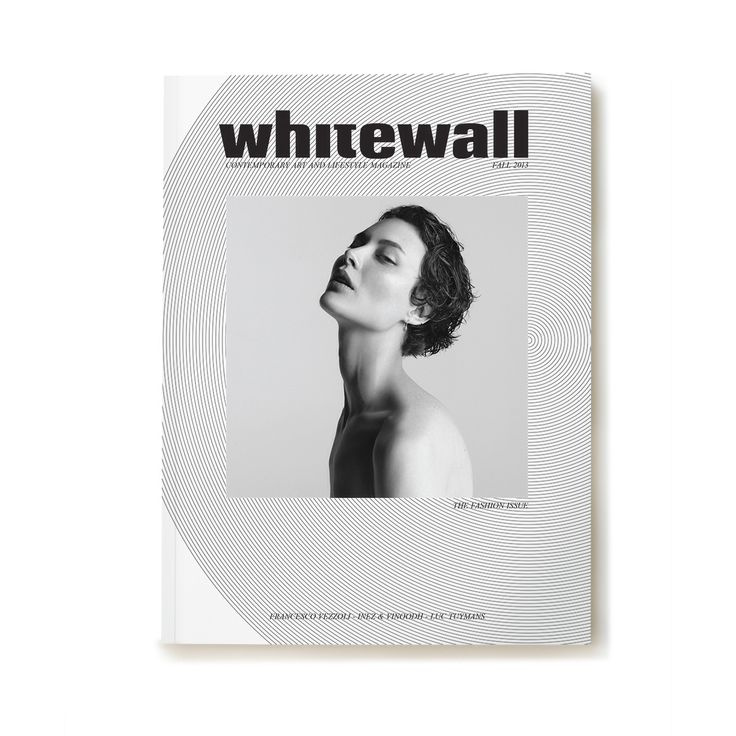Latifa Echakhch
“Artist to Watch”
by Susannah Tantemsapya
Whitewall Magazine - The Art Issue
(Fall 2013)
Latifa Echakhch questions and reconstructs stereotypes through objects found in quotidian life. Born in El Khnansa, Morocco, in 1974, and in 1978 her family immigrated to France, where she was raised. Since 2009 she has lived in Martigny, Switzerland. Echakhch floats between these cultures, defying any categorization. Recently nominated for the 2013 Marcel Duchamp Prize, her work is bold, understated, colorful, elegant, and political. Whitewall spoke with Echakhch during her installation of À chaque stencil une revolution (For each stencil a revolution).

WHITEWALL: À chaque stencil une revolution (For each stencil a revolution) is taken from a quotation by Yasser Arafat. He was referring to the proliferation of revolutionary groups and protest movements. How did you conceptualize your original piece in 2007?
LATIFA ECHAKHCH:
It always starts with the materials. I found blue carbon paper in some shops around. It reminded me of my childhood in school in France. All the teachers used a little stencil machine to reproduce text for the lessons. It was my memories of the material and the smell. I found it very beautiful–a very deep blue and full of pigment. First I hung a piece of carbon paper on my wall, thinking about what I could do with it.
Then I was thinking about what people made with this carbon paper. I found several things about political protests in the late 1960s, the students in Paris making strikes. It was quite easy for them because the machine to duplicate is very small, so they can have it in the basement, in a small room, to do it very secretly, in a clandestine way. I like this potentiality. It’s only carbon paper, but it has the possibility to be something more powerful.
At that moment, I was reading a lot of books about the Israeli-Palestinian conflict. I saw the quote by Yasser Arafat. It was not only referring to Middle East, but was about all the movements around the world. When I read this, I thought, “This is the potentiality, to have a revolution start with that.” The idea was to work with the process of duplication in a different way: to use carbon paper, alcohol on the material directly, without any sentence, without any slogan, without any message.

WW: Why did your family first move to France? How has your work helped you understand your own cultural identity?
LE: My father moved first for economical reasons. He had to find a job because there were not many jobs in Morocco at that time. Then he came back to marry my mother. I was born, and he decided to bring us to France. I arrived directly to the mountains, in the middle of the snow during winter in February. I didn’t go back to Morocco until I was 10. I've been there nine times in my life, always to see my family.
Last time I went, I took a car with my cousin and we decided to go with a tourist guide to visit some cities that I had never seen, like El Jadida. My story is really different from other stories of immigration. My parents wanted so much to be integrated into French culture that slowly we stopped speaking Arabic at home, so I forget my mother language. With my parents, we speak French. Now I am so sad because I've got to learn it again.

WW: How has your relationship with Morocco and the Arab World evolved?
LE:
Most of the time, I forget that I'm Moroccan. I try to forget that. Sometimes, it comes out and I remember. I will have some very deep expression or attitude, suddenly I become very Arabic. I did not grow up with close Arabic friends. If it was the case, I would speak Arabic. I would be more integrated in Moroccan culture. It's a strange paradox. I think now, building my family, with my daughter, I've got to work on it. Not because of me, because it's her concern, to give her answers. I need to go back and ask more questions.
I am very sensitive. Going back to Morocco is always very difficult for me. I'm completely lost. At the same time, I feel at home. I know the colors, the smell, and the luminosity of things. There is now a nice artist scene in Tangier, but I'm not in this group. I'm like the kid from the other block. I like to be a paradox. It's a luxury not to have to choose. I had a review in Artforum from a journalist who I never met in person. She wrote the entire article about me as a non-Western artist, constantly referring to that. My work in that exhibition was not about that, so she wanted to push me into that frame. I was a bit shocked. Maybe she thought that I just arrived from Morocco, that I did not speak English. I saw that it was really dangerous. It's not helpful for all the artists coming from immigrant backgrounds. It's very sad that it was in 2009. It wasn't 30 years ago. What did she mean by "Non-Western artist?"
WW: How old is your daughter and what is her nationality?
My daughter turned nine months yesterday. She is Swiss now; my partner is Swiss. As soon as I have time, I will get her a Moroccan passport. I'm not French. I am the only one in my close family that is not French. When I started to do all the paperwork, I lost my father and I think it changed. Why do I have to be French because it's a place that my parents chose? It was always the immigration of my parents, not mine.
Now, in Switzerland, I'm a real migrant because I chose to go somewhere. When I turned 30, I thought that I needed to now find a place. I was thinking of the United States, Sweden, Berlin... I ended up in Switzerland because my partner, Valentin Carron–who is an artist, too–is really related to this village. All his family comes from there. I don’t have any strong background. He has a very strong background, so I decided to follow his culture. I live in the mountains there. When I arrived in France, it was in the mountains, so when I move to Switzerland, I really felt at home because I was surrounded by the mountain landscape as a child. If there are mountains, I really feel that is where I come from.
- Print -


